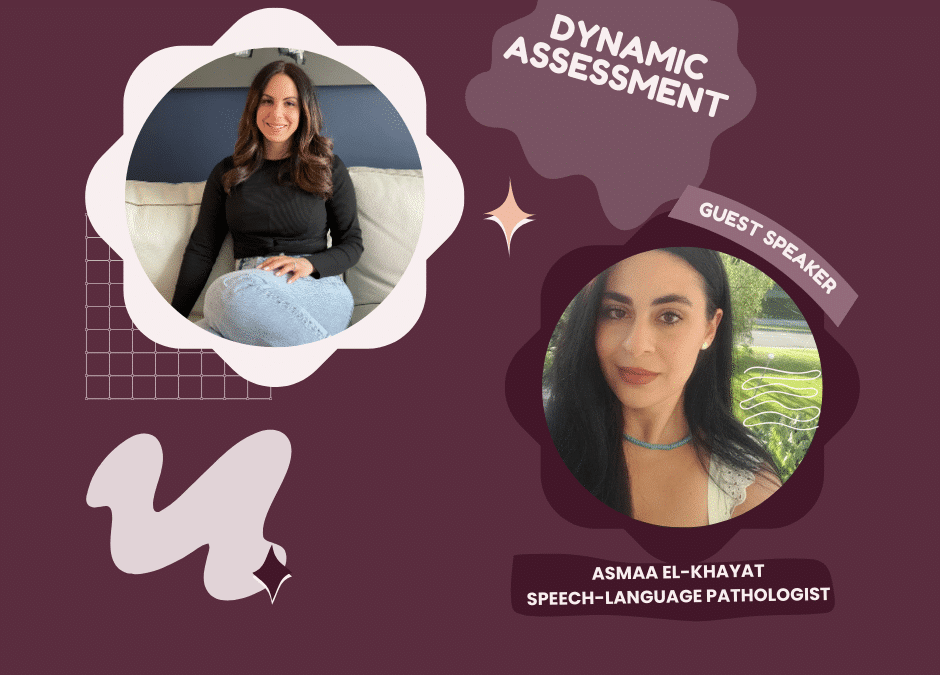Dynamic Assessment in Speech Therapy: A Comprehensive and Practical Guid
Summary: In this conversation, Melissa Farkouh and Asmaa El-Khayat explore dynamic assessment in speech therapy. Asmaa shares her experience transitioning from static to dynamic assessments and the benefits she has observed. You’ll discover the importance of cultural responsiveness in assessment and intervention, and how Asmaa incorporates innovative techniques. The challenge of distinguishing linguistic differences from disorders in multilingual children is also addressed. In conclusion, this discussion highlights the value of dynamic assessment for understanding a child’s abilities and adapting intervention plans.
Dynamic assessment in speech therapy is a valuable tool for speech therapists. It allows you to differentiate between linguistic differences and disorders. By observing a child’s cognitive processing and responsiveness, you can evaluate their abilities and learning potential. Unlike static assessments, which are often ineffective for multilingual and multicultural children, dynamic assessment helps you provide more accurate and meaningful reports to guide intervention decisions. As a speech therapist, it is essential to keep an open mind, use your clinical judgment, and prioritize the individual needs of each child.
Key Benefits of Dynamic Assessment in Speech Therapy
- Comprehensive Understanding: Dynamic assessment gives you a more complete understanding of a child’s abilities and needs compared to static assessments.
- Important Cultural Responsiveness: Considering the child’s cultural and linguistic context is crucial for accurate assessment and intervention.
- Engaging and Practical Techniques: Integrating real objects and creating a fun and engaging environment can make all the difference.
- Distinguishing Between Linguistic Differences and Disorders: Distinguishing between linguistic differences and disorders in multilingual children can be challenging, but dynamic assessment can inform your clinical decisions.
- Precise Intervention Planning: Dynamic assessment provides valuable information for setting goals and planning effective interventions.
- Use of Clinical Judgment: Using your clinical judgment and individualizing each assessment is crucial for producing accurate and meaningful reports.
Your Guide to Integrating Dynamic Assessment
The Transition to Dynamic Assessment
Asmaa El-Khayat shares her journey from static to dynamic assessments. She observes many benefits from this innovative approach. Dynamic assessment in speech therapy allows you to better understand a child’s abilities and create more tailored and effective intervention plans.
The Importance of Cultural Responsiveness
It is essential to consider the child’s cultural and linguistic context. This allows you to create a more respectful and accurate assessment environment. For example, using objects familiar to the child makes the assessment not only more precise but also more engaging.
Engaging and Innovative Assessment Techniques
Asmaa uses practical techniques like incorporating real objects and creating a fun and engaging environment. For example, she might use toys or everyday objects in her assessments to make the experience more enjoyable and natural for the child.
Distinguishing Between Linguistic Differences and Disorders
Distinguishing between linguistic differences and disorders in multilingual children is a challenge. Dynamic assessment in speech therapy helps clarify these distinctions and make more informed clinical decisions.
Why Adopt Dynamic Assessment in Speech Therapy?
As a speech therapist, dynamic assessment becomes indispensable. Unlike static assessments that often fail to capture the true abilities of multilingual and multicultural children, dynamic assessment offers you a more accurate and meaningful perspective. It allows you not only to better understand a child’s cognitive abilities but also to determine their learning potential and guide your intervention decisions.
My Advice for You
Stay open-minded and use your clinical judgment, while prioritizing the individual needs of each child. Dynamic assessment will provide you with valuable information for setting goals and planning effective interventions.
Join Me for an Introductory Webinar
Do you want to learn more about dynamic assessment in speech therapy? Sign up now for the waiting list to participate in my live introductory webinar. Together, we will explore this revolutionary approach and how it can transform your practice in speech therapy. See you soon, and I look forward to meeting you at the webinar! 😊
Video Interview with Asmaa El-Khayat
Watch the full interview with Asmaa El-Khayat to learn more about dynamic assessment in speech therapy:


